Dept: Keep An Eye Out For Two Invasive Plants
The Department of Environment and Natural Resources [DENR] is asking the public to keep their eyes out for two invasive vine species presently growing in Bermuda – kudzu and the hyacinth bean.
“DENR needs to monitor these invasive species in order to determine if they have spread and to what extent they pose a threat to the island’s plant life,” a spokesperson explained.
“Hyacinth bean was reported in 16 locations across Bermuda during a series of surveys in 2008. All locations subsequently received herbicide treatment or mechanical treatment at that time. By 2017 only six of those locations still had vines present. Between 2008 and 2017 six new locations had hyacinth bean present.
“The hyacinth bean is a self-pollinating, climbing vine of vigorous growth with trifoliate leaves approximately 4-20 cm long and 1.5-14 cm wide. The mature plant can be identified by the flower blossoms that are purple or white [depending on the variety; white appears to be more common on Bermuda].
“They are easy to spot since they grow in an upward fashion. These flowers then give way to seed pods which start out green [or purple depending on the variety] and turn into a khaki colour as it matures.
“Kudzu was recorded in three locations in 2008, including at the railway trail in the Grape Bay area where a big eradication effort had been made in 2004. All locations received treatment and by 2017 kudzu had disappeared from one site, was almost eradicated from the second site but the Grape Bay area showed heavy reinvasion.
Kudzu, note the trifoliate leaves, three distinct leaves sharing one common stem
“It is presumed that kudzu was imported into Bermuda from the U.S. in the 1970’s as a fodder crop for cattle. This vine grows up to one foot per day in the early summer and can cover everything in its path.
“Kudzu is recognized as a globally invasive species and poses a significant ecological and economical threat to any habitat that it can establish in. The older a kudzu patch is, the harder it will be to control, and the longer it will take to totally eradicate the plant.
The Department said it important to note that the hyacinth bean and kudzu can be mistaken for the endemic [and rare] wild Bermuda bean [pictured below], which is also a vine that has the trifoliate leaf but the shape of the leaves are different [smaller and more elongated].
“DENR is particularly interested in hearing from members of the public if they think they might have kudzu or the hyacinth bean on their property. Sightings can be reported on their website [www.environment.bm/contact] or via email [environment@gov.bm].
“It would be especially helpful if a good close-up photograph of the suspected vine is attached to the email [ideally showing the leaves, flowers and/or seed pods] to help DENR to identify it. Officers may be required to visit the premises to verify identification.
“If property owners are sure that the suspected vine is either kudzu or hyacinth bean [and not wild Bermuda bean] then DENR’s recommendation is to remove all of the seed pods first and put them in a large garbage bag, then the vine can be cut at the main stem.
The hyacinth bean vine looks very similar, only the leaves are smaller.
“All of the foliage should be added to the garbage bag. The fresh cut stump should then be treated with a systemic herbicide. The garbage bag should be taken to the Tyne’s Bay Incinerator for disposal.
“It is vitally important that people do not simply throw the vine cuttings into the bushes or try to compost the cuttings and seed pods because this will result in the spread of these species. For large, old plants annual follow-up spot treatments may be required for up to 10 years after the primary control effort. If people do not wish to use a herbicide then the root crown of the vine, and all of the rooting runners, must be removed.
“The root crown is a fibrous knob of tissue that sits on top of the roots below ground level. People will have to dig it up, completely remove and destroy all crown material. In order to totally control these plants, every rootstock must be killed otherwise the plant will come back and retake the site.
“Invasive alien species are defined as being non-native [to Bermuda], have the ability to become established in a new environment and are highly likely to cause damage to natural ecosystems, cause economic harm and even threaten human health.
“The adverse impacts of invasive species are considered to be the single greatest threat to island native biodiversity because island species have evolved largely in the absence of mainland predators, heavy competition and diseases.
“Island species can readily fall victim to invasive alien species, making easy prey, succumbing to the diseases they carry, and failing to effectively compete for resources like food and light. Aside from their negative impacts on native biodiversity, invasive alien species often impose an economic cost on agriculture, fisheries and infrastructure which can amount to millions of dollars.
“For kudzu/hyacinth bean specifically, they compete with native flora for light, blocking their access to this vital resource by growing over and shading other plants. Native plants may weaken and die as a result. If left it unchecked, it could spread and cover large portions of home owners’ yards and smother their hedges, plants and trees.
“DENR is hoping to control these potentially invasive vines before they get out of control, as has happened with other species of vine like morning glory and balloon vine.”
Read More About
Category: All, Environment, News

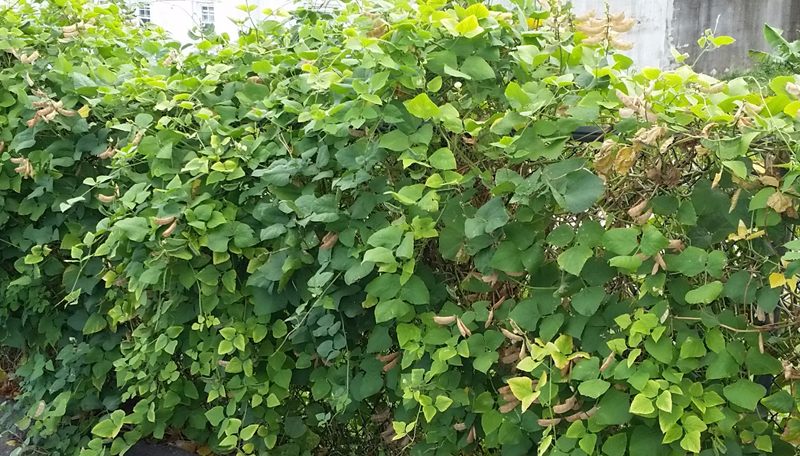
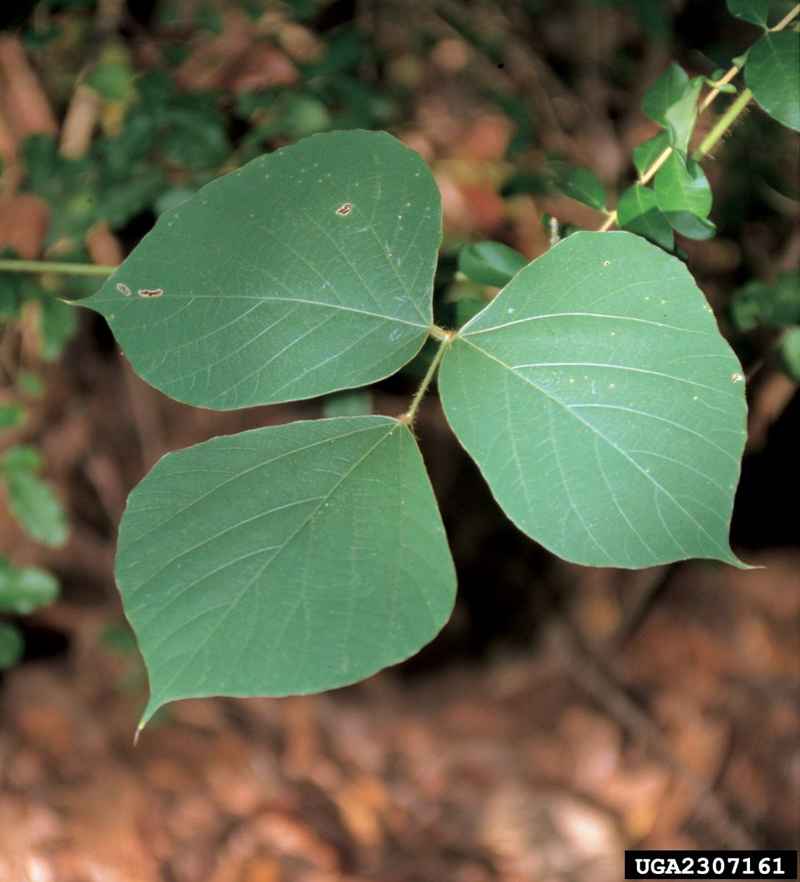
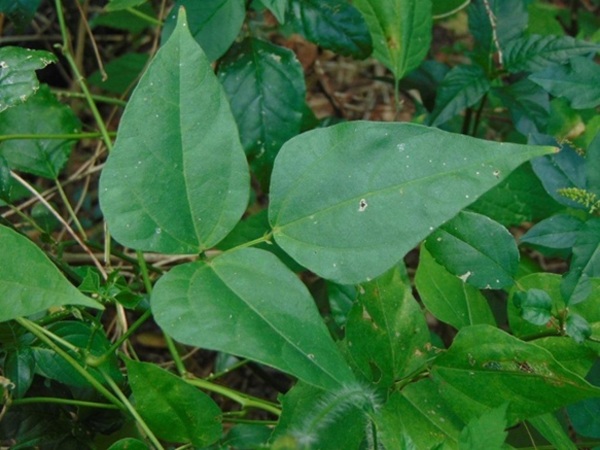
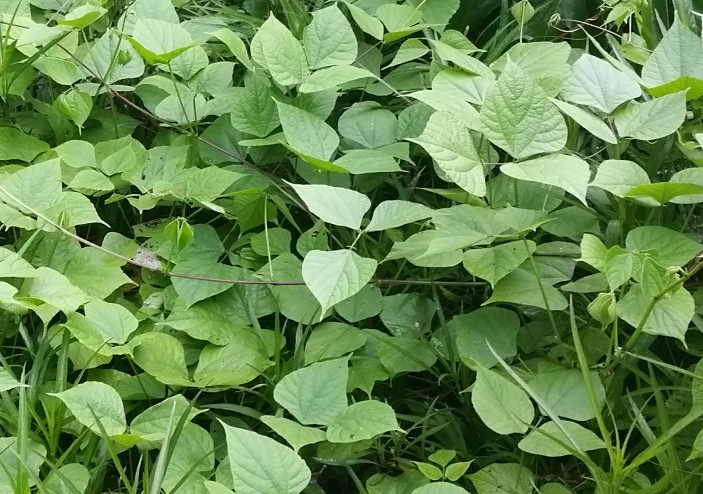
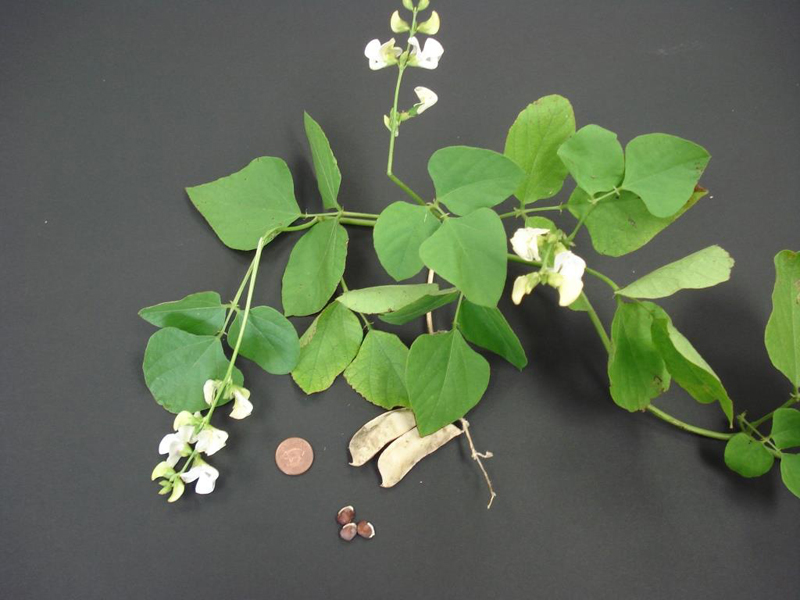


Far too late now!
it’s all over the Island.
Seriously? It’s everywhere isn’t it?
They’d be better off creating a easy to understand infographic on the plant and posting that.
So much for Comprehensive Immigration.
Your best comment ever. Well done, OJ.
Since DNER knows that there is a resurgence of kudzu at Grape Bay why not eradicate it? Shucks maybe you need to retreat! Maybe several times! Okay.
Hint! Turn onto Grape Bay Drive from South Road. at the Railway Trail stop. Look down to the right. That is your area of concern. Deal with it!
This area has been in trouble for years and the new DENR knows it. Why should this all of a sudden be newsworthy? If they were in the least bit proactive they would have already dealt with the problem. Obviously, it’s not such a big deal for the government but it does get a little media coverage.
Elephant ear (once an attractive house plant), bamboo and some others that I do not know the name of are invading. The vines are the worst of course because they smother everything. Elephant ear and bamboo are particularly nasty because herbicides have no effect it seems. Stop smuggling or legally importing this stuff people! The nurseries should take a lead here also and promote sensible practices.
The pet industry in the US is responsible for lionfish, snakes and other unwanted animals and they still have shows such as “Tanked” that promote this trade in so called exotic species.
I put a lot of time into trying to secure my borders but it never ends.
have to agree with previous posts – it is a good thing that the DENR are bringing these invasive pests to our attention, hopefully they are are doing something about it.
secondly, on recent occasions i have seen rats running over trash awaiting collection – on a main road and frolicking in the open grass at the Arboretum. this cannot be safe for children and people who sit and play on the grass. is this pest on the DENR radar?
I don’t get it. The island is going through the biggest rat infestation I have ever seen. The rat’s predator, the owl is pretty much extinct and the stray cats have mysteriously ended up down Ferry Reach, the Airport or dead. Seriously, how can they want us to be on the look out for a dang plant and not even comment on the damage the rats are causing to our environment?
the cats are doing a excellent job down clear water. they need some cats in St goe because they have a problem up there right after the bridge is where i see the most rats
I hate cats and rats.
Sadly these vine species have already become well ensconced throughout the island and the request from DENR come well after the horse has bolted from the stable.
These folks need to do better and be far more proactive.
Just my thoughts……….
There are so many invasive species here now and they makes our little island look ugly. Parks need to employ full-time crews to just concentrate on this problem; it will be forever ongoing.
The rat problem is extremely serious. Where is the Vector Control section of the Department of Health (it used to be a section to be proud of). As I drove down to SAL in Southampton the other day I saw quite a few run across the road towards the quarry. Maybe the operators should be spending time trapping instead of sitting in their vans in Vista spots during the day. You can’t drive at night without seeing the rats scurrying across the streets. We are far too small for us to be overrun by the plants and the rats. Bring back some owls!!!!